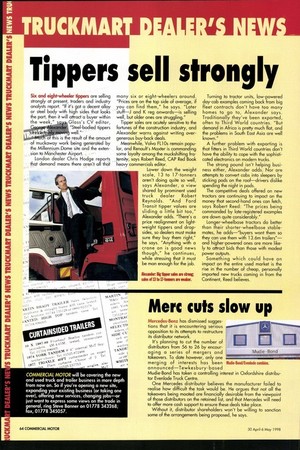Tippers sell strongly Six and eight-wheeler tippers are selling strongly
Page 61

If you've noticed an error in this article please click here to report it so we can fix it.
at present, traders and industry analysts report. "If it's got a decent alloy or steel body with high sides that looks the part, then it will attract a buyer within the week," says Glass's CV editor, nder. "Steel-bodied tippers oving well." o this is the result of the amount of muckaway work being generated by the Millennium Dome site and the extension to Manchester Airport. London dealer Chris Hodge reports that demand means there aren't all that many six or eight-wheelers around. "Prices are on the top side of average, if you can find them," he says. "Later stuff—J and K reg onwards—is selling well, but older ones are struggling." Tipper sales are acutely sensitive to the fortunes of the construction industry, and Alexander warns against writing overgenerous buy-back deals. Meanwhile, Volvo FL] Os remain popular, and Renault's Maxter is commanding some loyalty among the muckshifting fraternity, says Robert Reed, CAP Red Book heavy commercials editor. Lower down the weight scale, 13 to 1 7-tonners aren't doing quite so well, says Alexander, a view shared by prominent used truck dealer Robert Reynolds. "And Ford Transit tipper values are sliding a little bit too," Alexander adds. "There's a price realignment on lightweight tippers and dropsides, so dealers must make sure they buy them right," he says. "Anything with a crane on is good news though," he continues, while stressing that it must be man enough for the job. Turning to tractor units, low-powered day-cab examples coming back from big fleet contracts don't have too many homes to go to, Alexander says. Traditionally they've been exported, often to Third World countries. "But demand in Africa is pretty much flat, and the problems in South East Asia are well known."
A further problem with exporting is that fitters in Third World countries don't have the ability to cope with the sophisticated electronics on modern trucks.
The strong pound isn't helping business either, Alexander adds. Nor are attempts to convert cabs into sleepers by sticking pods on the roof—drivers dislike spending the night in pods. The competitive deals offered on new tractors are continuing to impact on the money that second-hand ones can fetch, says Robert Reed: "The prices being commanded by late-registered examples are down quite considerably." Longer-wheelbase tractors do better than their shorter-wheelbase stablemates, he adds—"buyers want them so they can use them with 13.6m trailers"— and higher-powered ones are more likely to attract bids than those with modest power outputs. Something which could have an impact on the entire used market is the rise in the number of cheap, personally imported new trucks coming in from the Continent, Reed believes.























































































































